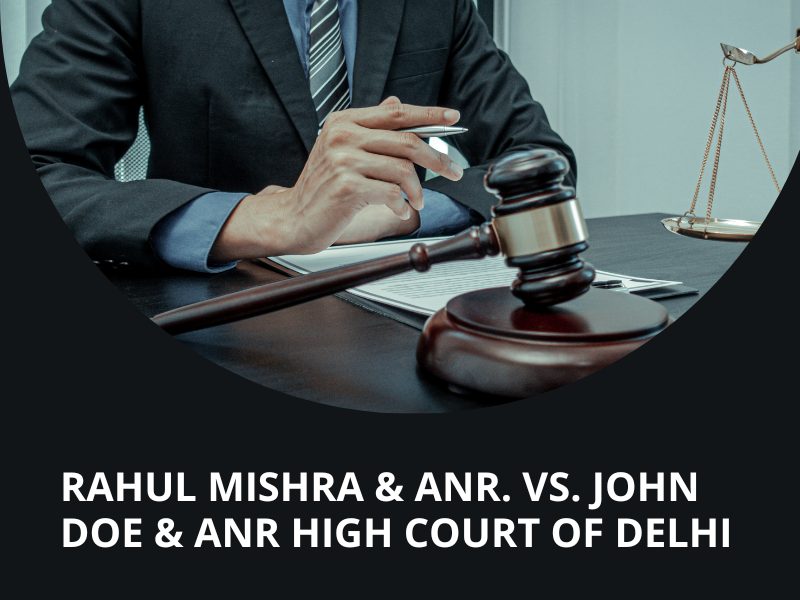The case at hand dates back to December 2024, wherein the High Court of Delhi passed “a John Doe order” in favour of world-famous Indian designer Rahul Mishra. Senior Counsel Mr. J. Sai Deepak represented the Plaintiffs on behalf of Khurana & Khurana.
Rahul Mishra (Plaintiff No. 1) is one of the celebrated designers based out of Delhi. Plaintiff No. 1 is creating unique, luxurious, and handcrafted apparel under ‘RAHUL MISHRA’ (his fashion label) and holds trademark registrations under various classes in India. Additionally, he is also the registered proprietor of the trade mark ‘RAHUL MISHRA’ internationally. Plaintiff No. 1 also owns the copyright in his original work and copyright in the designs of the dresses under the Copyright Act of 1957. Plaintiff No. 1 undertakes and executes his artistic designs through Plaintiff No. 2, which is his company. Plaintiffs carry out their work from their flagship stores, multi-brand retail stores, as well as via their official website, www.rahulmishra.in, which has had a presence since 1 September 2009. The images of the designer clothes posted on the website of the Plaintiffs are original artistic work and fall within the purview of Section 2(c) of the Copyright Act, 1957, and thus entitles the Plaintiffs to the exclusive rights over the posted images u/s 14 of the Copyright Act, 1957. The plaintiffs contend that by way of Section 15(2) of the Copyright Act, 1957, they hold the exclusive copyrights in designs. It was also claimed that only limited pieces were created, as a matter of practice, being less than 50.
The cause of action arose in the October 3rd week when plaintiffs came across the website of Defendant No. 1, ‘www.rahudress.com,’ through which Defendant No. 1 was selling/offering the exact replicas, counterfeit dresses of the exclusive dresses made and sold by the Plaintiffs and that too at a low and discounted price which was less than a fraction of the original price set up by Plaintiffs. Defendant No. 1 copied everything, including look, style, pattern, arrangement, Plaintiff’s trademark, and tradename. These replicas were taken from the official website of the Plaintiffs, ramp shows, and websites having fashion news, for instance, Vogue Runway’s e-website. The domain name of Defendant No. 1 is registered with Defendant No. 2, who is a Domain Name Registrar. However, from the website itself, the identity of Defendant No. 1 cannot be made out, and therefore, Mishra’s suit is against ‘John Doe-unknown individuals.’
The impugned act of Defendant No. 1 resulted in copyright infringement of the original artistic work in the photographs and infringement of copyright in the design of the said dresses. Additionally, such an act has also infringed the trademark of the Plaintiffs, design piracy, unfair competition, and passing off. Defendant clearly knew of the immense goodwill held by the Plaintiffs and took advantage of the same, thereby diluting the Plaintiff’s goodwill. The act of Defendant No. 1 of offering and selling counterfeit dresses via their impugned website was an apparent attempt to make commercial gains illegally.
Ultimately, the court was satisfied that the Plaintiffs had a prima facie case. Therefore, Justice Amit Bansal granted an ex-parte ad interim injunction, which is also a dynamic injunction. As the identity of Defendant No. 1 was then not known to the Court, the said order passed was a John Doe order to save the copyright in Rahul’s original artistic work and his registered trademark. The court was of the opinion that “The balance of convenience lies in favor of the plaintiffs and against the defendants. Irreparable injury shall be caused to the plaintiffs if the interim injunction is not granted. Disclosure orders are also liable to be passed against the defendant no.2 DNR.” Further when the Hon’ble Court made a query “regarding issuing blocking orders to the ISP qua the rogue website,” senior counsel submitted that they would take necessary steps in order to implead MEITY and DoT.
The Hon’ble Court directed that Defendant No. 1 and people acting on and for his behalf be restrained from “using, soliciting, manufacturing, selling, offering for sale, importing, exporting and advertising in any manner including on the internet and e-commerce platform, directly or indirectly dealing in goods impugned Tradename/mark “Rahul Mishra” as well as the device mark RAHUL MISHRA or impugned tradename/mark and device that is identical/deceptively similar to Plaintiff’s Tradename/mark “Rahul Mishra” as well as the device mark “/ RAHUL MISHRA.” Further, Defendant No. 2 DNR was also directed to lock and suspend the website ‘www.rahudress.com’ and restore Plaintiff’s original position. Defendant No. 2 was also directed to disclose the complete details of Defendant No. 1 in his possession.
The matter has now been listed for further proceedings on 7 April 2025.
The court’s order showcases the promptness in enforcing Intellectual Property Rights that involve counterfeit goods and online platforms selling such counterfeits. Further, it also underscored that the Courts are committed to protecting the rights of creators in their trademark and original artistic work in the designer clothing and fashion industry. Lastly, the grant of Dynamic injunction would allow for extending and applying the said injunction order to the mirror websites as and when identified without requiring the filing of a fresh suit. This will reduce the burden on the Courts as well as reduce the pain of Plaintiffs.
Author: Anavi Jain, in case of any queries please contact/write back to us via email to chhavi@khuranaandkhurana.com or at Khurana & Khurana, Advocates and IP Attorney.




